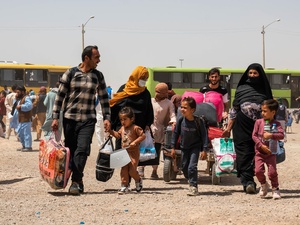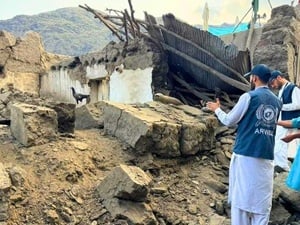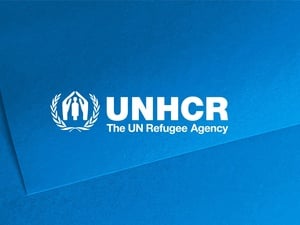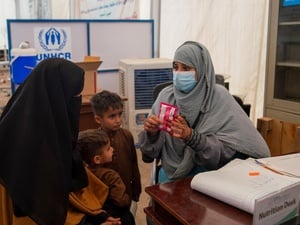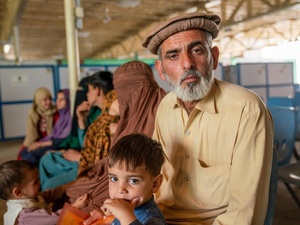Feature: Pakistan's complex Afghan refugee population
Feature: Pakistan's complex Afghan refugee population
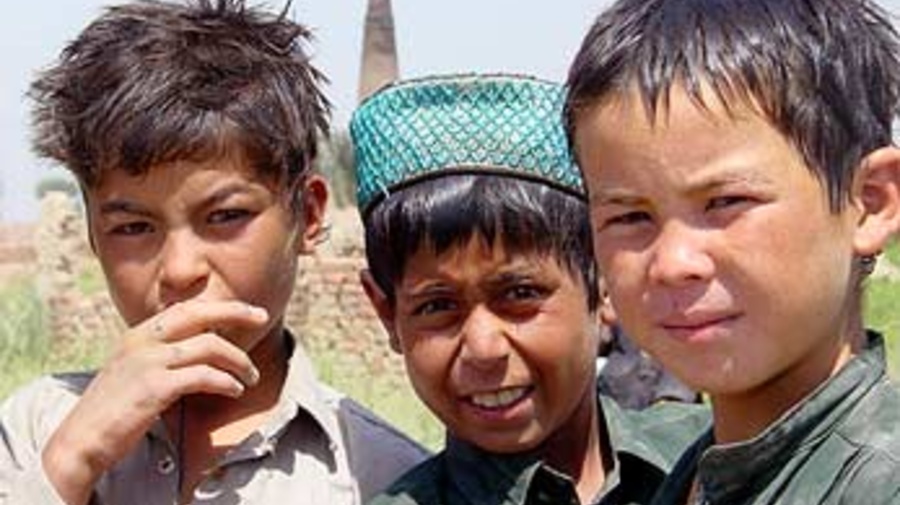
Ethnic-Uzbek Afghan children in Hyderabad, near the brick kiln where they work.
HYDERABAD, Pakistan, April 14 (UNHCR) - With spring temperatures already soaring past 40 degrees Celsius, Baidar is selling his house and will leave in weeks to join his father who repatriated to Afghanistan last September.
His story, in one sense, is not at all unusual: about 1.9 million Afghans returned from Pakistan in 2002 and 2003, while over 42,000 more have left since the programme resumed in March this year.
But, in another way, it is. Baidar arrived as an infant more than 30 years ago following the 1973 overthrow of the Afghan king, the first step in a steady descent into chaos from which the country is only now beginning to recover. Among a refugee population where the readiness to return home declines with the number of years inside Pakistan, Baidar is an exception.
"Always there is some inner feeling for your homeland," said the Afghan, who works in one of the glass bangle factories for which Hyderabad is known. "Every day for 30 years my father said he wanted to be back in Afghanistan."
"In past years I never thought of going back, but now security and economic conditions have improved," he said amidst a group of Afghans who have lived for years in the city on the edge of the Indus delta.
Many of the others in his long-established Amani Shah district, which houses some 500 Afghan families, do not sound likely to repatriate. As UNHCR staff discussed repatriation with a group, a passing Pakistani woman shouted that Afghans would never leave.
Baidar, along with his younger brother who was born in Pakistan and is also about to repatriate, illustrates the complexity of the Afghan population in the neighbouring countries.
After decades of refugee flows, Afghans outside their homeland comprise many diverse groups. Some fled persecution, others came seeking economic opportunity. Some fled the Soviet invasion of 1979, others fled the Taliban in the 1990s, yet others were driven from Afghanistan by drought. Some plan to go home in the remaining two years of UNHCR's programme to assist repatriation, others are too settled to contemplate leaving Pakistan.
The overwhelming majority of Afghans in Pakistan's Sindh province are in the sprawling metropolis of Karachi, where perhaps 14 million people are jammed between arid flatlands and the Arabian Sea.
But a recent UNHCR field trip into Hyderabad, the province's second largest city, found small pockets of Afghans such as ethnic Uzbeks working in the brick kilns and the neighbourhood where Baidar has lived for decades. Some 70 families labouring in the kilns have requested assistance to go home as a group in the next month.
Since the UN refugee agency's voluntary repatriation scheme began in 2002, more than 200,000 refugees have been assisted to go home via the UNHCR offices in Karachi. While only 35,000 of those left in 2003, more than 3,000 Afghans have returned from Karachi since the programme resumed at the beginning of March.
Since there was no definitive estimate for the Afghan population of Karachi - or the Pakistani population of the city for that matter - there is no way to say how many Afghans remain there. That might become clear if UNHCR and the government of Pakistan proceed with a proposed census and registration.
What is clear is that some refugees will still be in Pakistan when the voluntary repatriation programme ends. The tripartite agreement grouping UNHCR and the governments of Afghanistan and Pakistan, which is the forum for managing the repatriation programme, runs only until March 2006.
Abdul Rafiq, who was boarding a bus at the UNHCR departure centre in Karachi along with his wife and eight children, had a clear reason to head back to Kabul after nine years in exile in Pakistan. He has been promised his old position, as a colonel in the artillery, ending years spent as a commercial painter.
But he knows not everyone is in the same position. "Some refugees are better off there," he said of his homeland. "Some are better off here."
Decades after the first refugees arrived from Afghanistan, there is the start of a debate on the status of those Afghans who will still be in Pakistan in another two years. Some will undoubtedly need the continuing protection of official refugee recognition, others might receive a different status reflecting the traditional migration of labour in the region.
The difficult in easily categorizing Afghans is illustrated by Baider himself. While he considers himself an Afghan, he holds a Pakistani identification card and has been in Pakistan so long that his family was covered by a Pakistani government decree of the 1970s that gave him title to his house.
What is his status? He has papers showing him as both Afghan and Pakistani. Originally a refugee driven out by his family's fear of political persecution, he is now in Karachi for economic reasons. However, unlike others, his status should soon be clear - returnee to Afghanistan.


